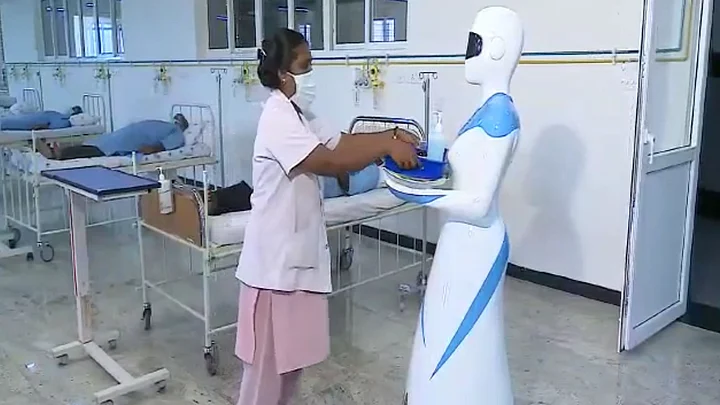While health departments of every state are working round-the-clock to trace contact and travel history, beef up infrastructure and ensure social distancing, here is a company with a unique solution to contain the spread of the coronavirus pandemic.
Sanitation of hospital wards, especially isolation wards, public spaces and public transport is the need of the hour and it is not humanly possible for sanitation workers to disinfect every nook and cranny.
So Katomaran Technology and Business Solutions, Dotworld Technologies and Aries Biomed Pvt Ltd have proposed robots to disinfect spaces with UV rays and provide food and medicines to patients in isolation wards.
Meanwhile, the Tamil Nadu government, with the help of a Trichy firm, is also testing "robotic nurses" that will be used in coronavirus wards to deliver food and medicine. “This will limit the amount of direct contact doctors and nurses have with patients, thus reducing the risk of infection,” tweeted Vijayabaskar, state health minister.
UV Sterilisation Tower
Ultraviolet germicidal irradiation (UVGI) is a disinfection method that uses short-wavelength ultraviolet (UV-C) light to kill or inactivate microorganisms. This technology has been used in water treatment and sanitisation in hospitals.
“Before normal life resumes, it is necessary that every home and public space is sanitised and this is impossible with just sanitation workers and also very expensive. Especially isolation wards in hospitals and railway stations and bus stands, need to be sanitised continuously,” said Aravind, COO, Dotworld Technologies.
The ‘dokat Cura,’ is a UV sterilisation tower that can be used in public places like hospitals, public transport like buses, trains, common areas, and even households. These battery-operated towers can be controlled with a remote and operated from a safe distance.
Presently, the sanitation work is carried out by the corporations. The current process involves manual spraying of liquids. However, this would not be an efficient process as there are a lot of human interventions.
The Robot Nurse
Doctors, nurses and other medical staff have been our frontline soldiers in this fight against the deadly novel coronavirus, and they are most at risk. The risk factor has also been dangerously high due to the lack of adequate personal protective equipment (PPE).
Since the outbreak, several of them, who were handling the patients, have tested positive.
The robot nurse ‘dokat Aura’ will come in handy as it can be used to help in the supply of food and medicine to the isolation wards. The robots will run along photosensitive strips on the ground and can carry supplies, greet patients and communicate through a series of simple phrases. With optical or magnetic sensors, the robots can know exactly where to stop in the wards and return to their base after the medicine is delivered.
“In Italy, for every 10 health workers, one person is being infected by the coronavirus. We can’t eliminate the doctors and nurses from the equation because patients do need their direct care. But there is a second level of workers who provide food and medicines. So we can attempt to isolate these workers. With robot nurses, we can provide everything on time and this can be tracked and registered with the help of our software,” said Aravind.
Not an Expensive Proposal
“We approached the Tamil Nadu Health Minister Vijayabaskar just before the lockdown and he was very pleased with our idea. He asked for a pathological test report, but we were unable to furnish that because we need a government hospital to grant us that. We have tested at PSG Medical College in Coimbatore,” said Rajendran, mentor of Dotworld Technologies.
Is this an expensive proposition? No, says Aravind.
“In China and Italy, such robots would cost Rs 20-30 lakhs which is definitely not affordable for the Indian markets, but we have been in this field for long and can manufacture robots for Rs 5 lakhs if it is 1-2 numbers. And if it is bought in bulk, we can manufacture at Rs 1-2 lakhs,” he said.
The team has been approached by Malaysia and Singapore but since they can’t get permission from a government hospital or open factories to start manufacturing, they have not been able to.
The team recently reached out to the Coimbatore collector to see if they could get the help of medical professionals at a government hospital to help turn their "theoretical calculations into practical use." However, owing to the number of developments on the health front, the official was unable to give them his word.
The team said they are trying to reach out to the state and central government to see if they could take this forward.
(At The Quint, we question everything. Play an active role in shaping our journalism by becoming a member today.)
